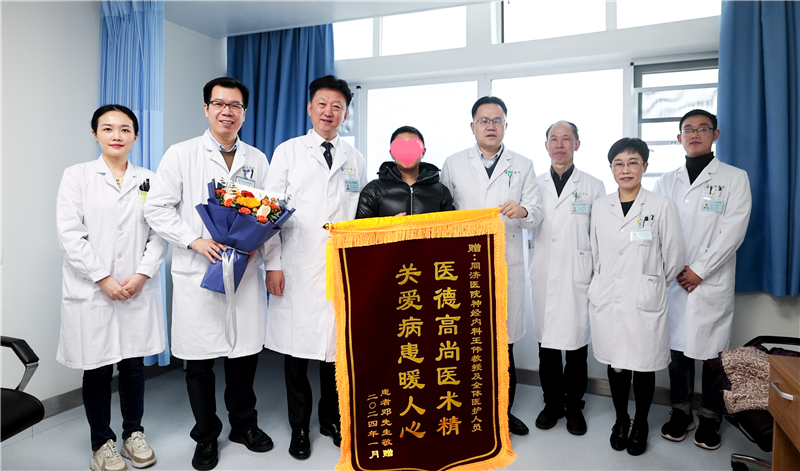On January 30, Prof. WANG Wei's team from Department of Neurology, Tongji Hospital, Huazhong University of Science and Technology (HUST), for the first time in the world, applied CAR-T cells (CT103A) targeting B cell maturation antigen (BCMA) for the treatment of relapsed and refractory immune-mediated necrotizing myopathies, and achieved remarkable clinical efficacy. Meanwhile, WANG Wei's team have also provided an in-depth portrayal of the potential molecular mechanisms of CAR-T cell therapy for autoimmune diseases, and the remodeling of the post-treatment immune microenvironment by utilizing single-cell RNA sequencing, immune repertoire analysis and other technologies. For his team, this is another important breakthrough after the successful treatment of Neuromyelitis optica spectrum disorder (NMOSD) with CAR-T cells. The research paper "Single-cell analysis of refractory anti-SRP necrotizing myopathy treated with anti-BCMA CAR-T cell therapy " was also published online today in the prestigious international journal "PNAS (Proceedings of the National Academy of Sciences of the United States of America)".

Professor WANG Wei explained that immune-mediated necrotizing myopathy is an autoimmune disease associated with autoantibodies and could be divided into various subtypes. Anti-SRP necrotizing myopathy, from which Mr. Deng suffered, is one of the subtypes with the highest degree of refractoriness and disability, and usually requires high-intensity, combined, and long-term immunosuppressive treatments. However, the clinical effectiveness of these traditional treatments is relatively limited, and there is a high risk of recurrence.
Seven and a half years ago, when 18-year-old Mr. Deng was preparing for the College Entrance Examination, he suddenly found that his limbs were weak and painful, and the condition deteriorated rapidly. He was then diagnosed with immune-mediated necrotizing myopathy at Tongji Hospital, and began to receive a variety of immunotherapy. Unfortunately, he kept suffered from persistent impairments with recurrent attacks and could only be "paralyzed" in bed.
CAR-T cell therapy is a gene editing-based cell therapy, including harvesting T cells from the patient, engineering them to express chimeric antigen receptors (CARs), and infusing them back. Mr. Deng, who suffered from recurrent attacks, received anti-BCMA CAR-T cell therapy (CT103A), which was approved by the National Medical Products Administration for the treatment of multiple myeloma.
"CAR-T cell therapy has given Mr. Deng a new lease of life. After the treatment, his muscle strength gradually recovered and he was able to return to normal life." Professor WANG Wei said. It is worth mentioning that Mr. Deng studied clinical medicine as an undergraduate, but failed twice in the postgraduate examination because of the persistent recurrence of the illness. Especially for the second chance, he passed the written examination but failed the following interview since he could only undergo a video interview in the bed of hospital. After CAR-T treatment, Mr. Deng exhibited favorable safety profiles and persistent clinical improvements, and finally succeeded in the postgraduate examination and became a medical postgraduate. Currently, after one dose of CAR-T cells, Mr. Deng was able to live a healthy life without any other concomitant treatment for nearly 2 years.

Not only limited to Mr. Deng, efficient removal of abnormal pathogenic B cell lineage and successful generation of brand-new B cells with distinct clone types, suggestive of the achieved immune remodeling, were also observed in several patients with other autoimmune diseases who received CAR-T cell therapy.
There are many kinds of autoimmune diseases characterized by recurrent attacks and protracted course of disease, causing great burdens for patients and their families. Meanwhile, due to the complex pathological mechanism and limited therapeutic strategies, some patients with refractory disorders even eventually fall into the situation of no drugs available. In this regard, the current report from Prof. WANG Wei's team on CAR-T therapy in autoimmune diseases show promise in terms of feasibility and potential efficacy and provide another option for the patients with relapsing and refractory autoimmune disorders.

